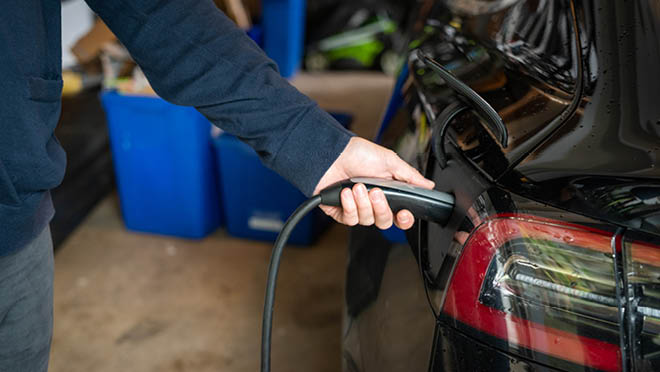Metering and billing options for multi-unit residential buildings

Ways to monitor and pay for EV charging at your building
If you're planning to install electric vehicle (EV) chargers at a multi-unit residential building such as an apartment or condo property, one of the common challenges facing stratas or condo owners is figuring out how the electricity use for charging will be tracked and billed.
We've outlined the different metering and billing options below, as well as steps to get started.
Keep in mind that these options are mutually exclusive and combinations are not permitted. For all of these options, customers are responsible for the rewiring (electrical alteration and permit costs) and BC Hydro connection charges, if applicable.
The BC Hydro charge to connect an additional meter will depend on the work required and our designer will provide a quote.
Option 1: Use an existing common account
With this option, stratas can request to add the EV chargers under an existing common use area account – the account you use for electricity in common spaces such as hallways, parkades, and mailrooms.
- No additional service connection or additional meter is required.
- Electricity use from the EV chargers will be recorded by the existing common use account meter.
- If the strata wants to pass on the electricity costs to the residents for using the EV chargers, the strata will need to administer the billing and payments of the EV charging separately from your BC Hydro account through some other means.
Rates
Electricity use from the EV charger will be billed under the existing rate for common use area account. This is typically either the Residential Conservation Rate or one of the General Service Rates.
Option 2: Separate meter and account for all charging
With this option, stratas can request a separate meter to measure the electricity use from EV chargers under an account separate from an existing common use account.
- Only one meter will be installed to record the usage for all EV chargers together. The meter will need to be installed so that electricity use from the EV chargers is not recorded by the existing common use area meter. The strata is responsible for the costs of the additional meter installation.
- Electricity use from the EV charger(s) will be billed on a separate account from the existing common use account.
- If the strata wants to pass on the electricity costs to the residents for using the EV chargers, the strata will need to administer the billing and payments of the EV charging separately from your BC Hydro account.
Rates
Residential-only buildings can choose to set up the account under the Residential Conservation Rate or one of the General Service Rates.
Mixed-use buildings with both residential and commercial access to the chargers must set up the new account under one of the General Service Rates.
If you choose, you can opt for consolidated billing, ensuring that you have multiple meters and accounts, accessed through a single bill. This allows you to see the EV charger costs separately from existing common use accounts, but have the ease of paying them together.
Option 3: Separate meters for individuals
In some cases, individual unit owners with assigned parking stalls and the necessary electrical infrastructure can request a separate meter for their EV charger.
- The unit owner has to obtain approval from the strata for the electrical work required to install the additional meter, and is responsible for the costs of the additional meter installation.
- An electrical contractor must review the layout of the electrical room and strata complex to determine the feasibility of installing a separate meter for your EV charger.
- Electricity use from the EV charger will be recorded by the additional meter. The meter will need to be installed so that electricity use from the EV charger is not recorded by other existing meters.
- Not compatible with load management configurations of chargers.
- For residential customers, the electricity use from EV charging will be combined with the owner's unit electricity use and billed under the existing residential account.
- BC Hydro will bill the individual unit owners directly for their EV charging use.
Rates
For residential customers, the electricity use from EV charging will be combined with the owner's unit electricity use and billed under the existing residential account according to the selected rate plan.
Customers who can charge their EV overnight may want to opt into our tiered rate with time-of-day pricing. Under this plan you'll get a discount on any electricity used overnight and a surcharge for on-peak (4 p.m. to 9 p.m.) usage.
Learn more and find out how to opt in
For commercial customers, the electricity use from EV charging will be billed on a separate account under one of the General Service Rates.